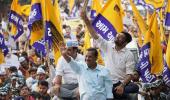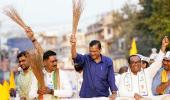As the Kejriwal empire spreads, will he be able to keep the momentum going?

When it was launched in October 2012, many dismissed the Aam Aadmi Party as an intervention by a set of well-meaning political dilettantes.
Those who gave it credence would say that it was 'different'.
"A political alternative that appeared realistic mainly due to three novelties: One, its initial leadership was drawn from diverse walks of life and completely apolitical with only a kindergarten learning of Gandhian philosophy and Swarajya, courtesy the India Against Corruption movement; two, the party did not latch itself to any philosophical underpinnings and did not require political marketing for creating an ideological mass cadre -- it solely focussed on removing corruption from public life; and three, the entry points of the party opened to the common man and its leadership was broad-based, sans a bureaucratic hierarchy, strictly adhering to collective decision-making based on consensus," says Praveen Rai of the Centre for Developing Societies and co-author of Measuring Voter Behaviour in India.
But in the following 10 years, AAP has proved to be a serious political player, to the point where it is being seen as a replacement for the Congress as a primary national opposition party.
AAP's electoral journey started in the 2013 Delhi assembly elections when it won 28 of the 70 assembly seats. The disappointment of being a minority player in government formation was tempered by the defeat of three-time chief minister Sheila Dikshit at the hands of Arvind Kejriwal, and the fact that the Congress got just eight seats in the election compared to the 43 it had won in 2008.
The Kejriwal-helmed government fell, inevitably, and the 2014 Lok Sabha elections followed.
This time, the AAP won four Lok Sabha seats in Punjab. This would be the prelude to the party forming a government in that state in 2022, upending not just the Congress but also the deeply entrenched Shiromani Akali Dal (SAD).
The 2015 Delhi election saw a massive AAP consolidation in the capital: It got 67 of the 70 seats in the Delhi assembly, with a record vote share of 54 per cent. But the journey of organisational growth has also been marked by political compromise.
'Specifically, people like me and Prashant Bhushan failed to foresee the most dangerous personality trait of Arvind Kejriwal: His willingness to sacrifice everything at the altar of electoral success. I found him ambivalent on issues of social justice and dithering on secularism, but not, on the whole, a pucca Sanghi,' commented former comrade Yogendra Yadav who fell out with the AAP, in a signed article in September 2021.
'The real problem was not that he was 'Muslim hater (he was not, and I believe he still is not)’ but that he was willing to do anything for the sake of votes. We seriously underestimated his insecurity, his stranglehold over the new party, and his ability to manipulate everything and everyone,' Yadav pointed out.
Yadav's argument focused on Kejriwal and his role. But while as a party the AAP saw a gap in the system and used it to its advantage, its fuzziness on many issues did confuse voters.
What it claimed with pride was its USP -- that it stood for issues, shunning traditional politics of caste and religion -- would pose a problem.
AAP has never commented on the quota for Economically Weaker Sections, for instance, though it pays routine homage to Babasaheb Ambedkar and Dalits generally.
It has avoided commenting on the role of the 'State' in governance.
And though it claimed EVMs were responsible for its defeat in the Delhi municipal election in 2017 (it lost 22 per cent votes versus the assembly elections of 2015), the same EVMs seem to have performed flawlessly in 2022!
But there is no doubt that earning the tag of national party has fuelled the party's ambitions for more.
As the Kejriwal empire spreads, will he be able to keep the momentum going?
And will it be at the cost of greater centralisation of authority in the party?
That is what needs to be watched.











